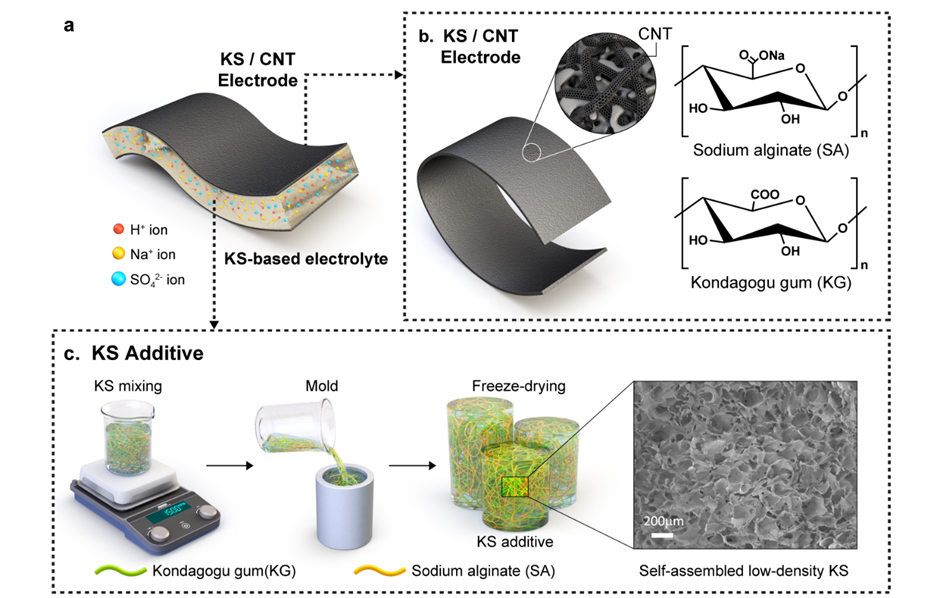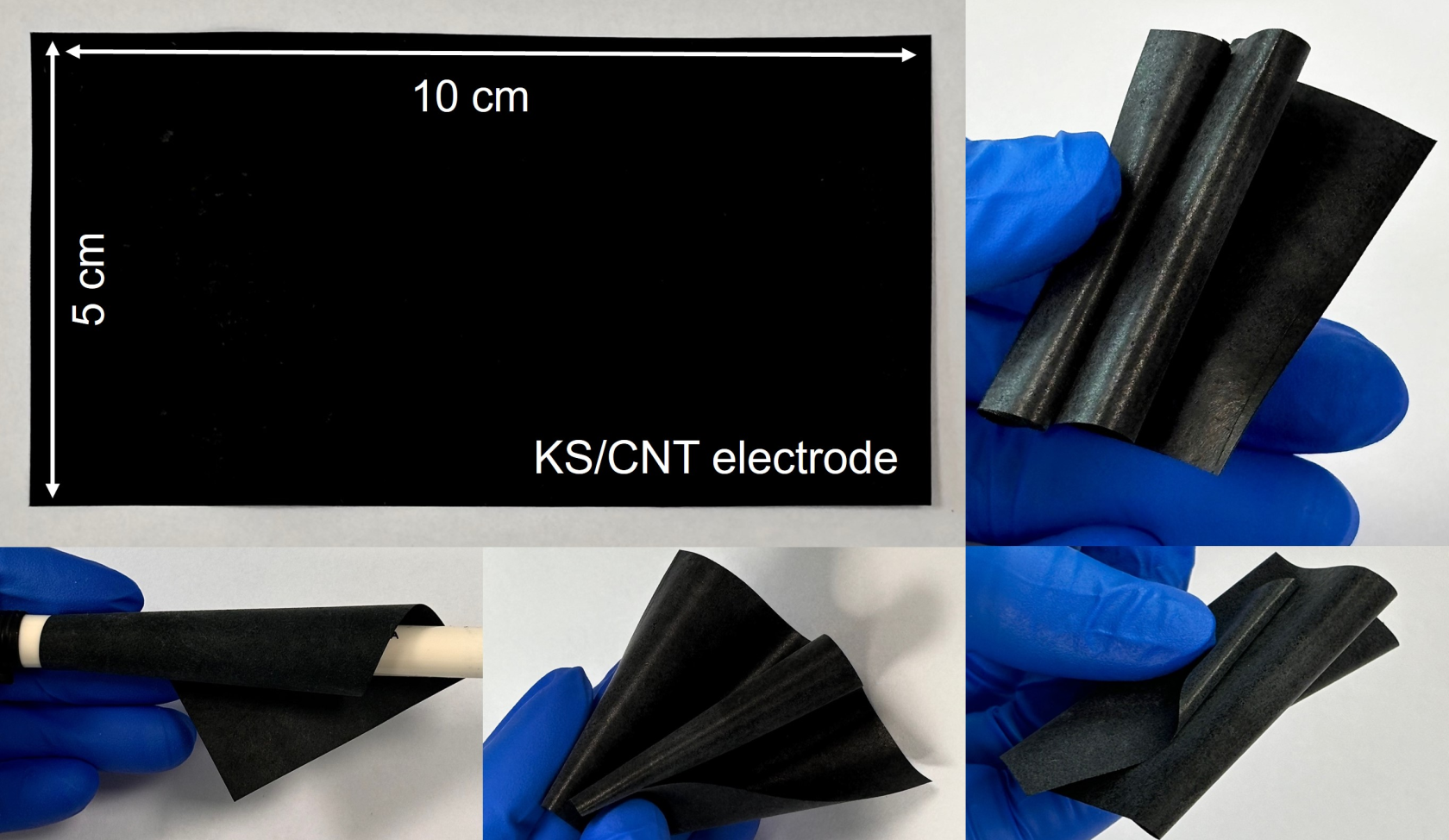- About Ajou
- Admission
- Academics
-
Research
Research
-
International
International
- Campus Life
-
News and Event
News and Event
- AUT
Ajou News
NEW Prof. Taekwang Yoon’s Research Team Develops Eco-Friendly Additive to Enhance Performance and Lifespan of Supercapacitor
- 2025-05-02
- 26

* In the photo above – from left: Professor Taekwang Yoon (Ajou University), Seonghun Lee (Ph.D. integrated program student, Ajou University), Ji-Young Park (Master’s student, Ajou University), and Hyungseob Yoon (Ph.D. integrated program student, Chung-Ang University).
Professor Taekwang Yoon’s research team at Ajou University has developed a natural rubber-based electrolyte additive that dramatically improves the performance and lifespan of supercapacitors. By utilizing eco-friendly and cost-effective materials, this innovation is expected to become a significant milestone in securing the sustainability of supercapacitors, one of the leading high-performance energy storage technologies.
Professor Taekwang Yoon (Department of Applied Chemistry and Graduate School of Molecular Science and Technology) and his team announced that they successfully enhanced the performance and durability of supercapacitors by developing a novel electrolyte additive based on biopolymers.
Their research findings were published online in the April issue of Energy Storage Materials under the title, “Long-lasting supercapacitor with stable electrode-electrolyte interface enabled by a biopolymer conjugate electrolyte additive.” Professor Yoon served as the corresponding author, with Seonghun Lee (Ph.D. integrated program student at Ajou University), Ji-Young Park (Master’s student at Ajou University), and Hyungseob Yoon (Ph.D. integrated program student at Chung-Ang University) contributing as co-first authors.
Supercapacitors are next-generation energy storage devices that offer significant advantages over conventional batteries. They do not use lithium (Li), making them environmentally friendly, and are capable of storing large amounts of electrical energy. With their ability for rapid charge and discharge cycles and their virtually unlimited lifespan, supercapacitors are increasingly seen as a viable alternative to traditional batteries. They are already being utilized as supplementary power sources in fields such as electric vehicles and renewable energy systems, and are expected to find even broader applications in the future.
Unlike batteries, which rely on chemical reactions and ion diffusion to store energy, supercapacitors store energy through surface-controlled reactions at the electrode-electrolyte interface. Thus, the stability of this interface plays a critical role in determining the electrochemical performance of supercapacitors.
Because of this, ensuring the stability of the electrode-electrolyte interface has been a key research focus for improving supercapacitor performance. Various approaches have been explored, such as ▲polymer coatings ▲the use of self-healing inks based on 3D printing ▲surface modification using atomic layer deposition (ALD) techniques. However, these methods have faced limitations regarding process complexity, environmental concerns, high costs, and scalability challenges for mass production.
In particular, maintaining stable interface characteristics over long periods while preserving high power output remains a major challenge. Over time, the electrode-electrolyte interface tends to become unstable, leading to the accumulation of by-products and the deterioration of electrochemical performance. In response, the Ajou University research team set a goal to develop a high-performance system that meets the demands of long-term stability, reliable operation, and environmental sustainability.

a. Schematic of the supercapacitor developed by Professor Taekwang Yoon’s team at Ajou University.
b. Schematic illustration of the electrode structure.
c. Schematic depiction of the electrolyte additive fabrication process.
The additive, made from gum kondagogu (a by-product of natural rubber production) and sodium alginate(extracted from seaweed),
is eco-friendly, cost-effective, and highly efficient.
To solve the instability problem of the electrode-electrolyte interface in conventional supercapacitor systems, the Ajou University research team developed a conjugated KS (gum kondagogu/sodium alginate) additive using eco-friendly natural rubber-derived gum kondagogu and sodium alginate extracted from seaweed. This additive boasts excellent solubility in aqueous electrolytes, improving ion conductivity and mobility, resulting in significantly enhanced performance compared to traditional electrolytes.
Notably, adding even a small amount of the KS additive to sulfuric acid (H₂SO₄)-based electrolytes substantially improved interface characteristics. After 30,000 charge-discharge cycles, the capacitance retention rate increased from 58% to 93%. This remarkable result was achieved because the protective layer formed on the electrode surface suppressed by-product generation and facilitated smooth ion and electron transport.
Compared to conventional chemically synthesized electrolytes, the KS additive-based electrolyte offers simpler processing and lower costs, making it highly promising for industrial applications. Additionally, the KS additive, being a natural polysaccharide-based biopolymer, is abundant, recyclable, and inexpensive, providing excellent scalability for mass production and large-scale processing.
The research team expects that this study will establish a core technology for next-generation eco-friendly energy storage devices. In particular, electrodes made from the same biopolymers as the additive exhibit excellent flexibility and are easily manufacturable on a large scale, making them applicable not only to wearable electronics but also to large-scale energy storage systems.
Professor Taekwang Yoon stated, "Through this research, we have significantly improved the electrode-electrolyte interface stability of supercapacitors, developing an eco-friendly and industrially applicable energy storage technology," and added, "We plan to continue with follow-up research aimed at applications in various fields."
This research was supported by the Ministry of Science and ICT, the National Research Foundation of Korea, the University of Glasgow Startup Fund, and the AMRITA Seed Grant.

*An image showing the flexibility of the large-area KS/CNT electrode developed by the Ajou University research team.
The electrode maintains its structural integrity without damage under various mechanical deformations, suggesting its potential application in energy storage systems for wearable electronic devices.
